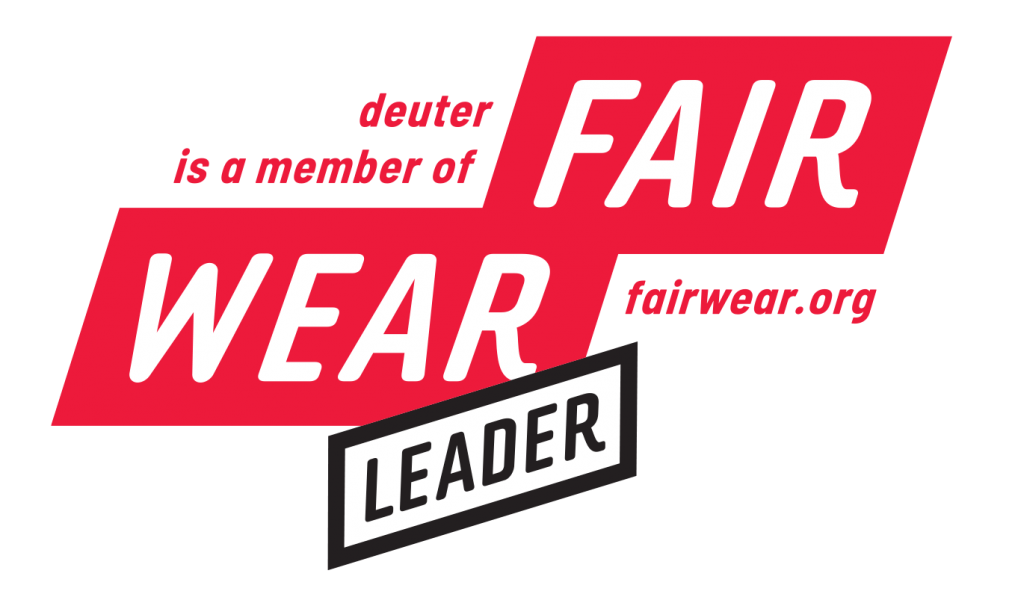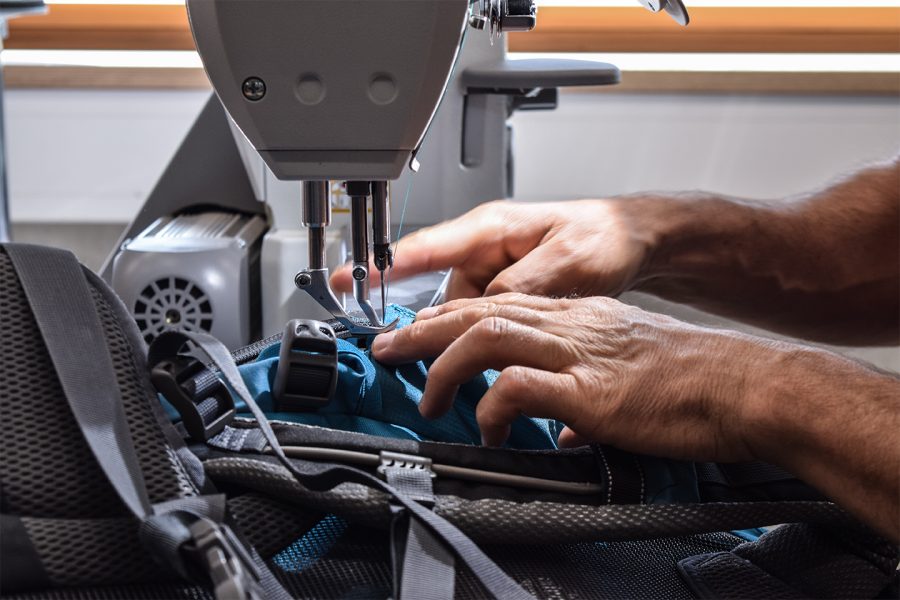Even the most conscientiously made outdoor equipment creates an ecological footprint. At deuter, we want to keep that footprint as small and light as possible. That’s why we have adopted the bluesign® system – the world’s strictest standard for environmental protection, occupational safety and consumer protection in the textile industry – to guide us in our production.
Sustainability where textile production is concerned is an issue that affects us all. After all, it’s about what we wear on our bodies every day. Whether it’s jeans, a functional jacket or a backpack for hiking, biking or ski touring, the manufacturing process is complex and can have a significant impact on people and nature. So we want to make sure we minimize that impact. Which is why we are always looking for ways to optimize consumption at every stage of the production chain – from raw materials to finished product.
This includes the quantity, type and quality of materials used just as it does energy and water consumption, or the handling of chemicals, noise pollution, the waste generated and occupational safety. In our efforts to minimize the impact of our manufacturing processes on the environment, we’ve applied the bluesign® standard since 2008. It’s a coherent approach that fits perfectly with our 360° Responsibility strategy.

FAIR FROM A TO Z – WITH THE FAIR WEAR FOUNDATION
We are celebrating a small anniversary – deuter has been a member of the Fair Wear Foundation for ten years. A milestone in our efforts to achieve socially just working conditions. Because fairness is important to us throughout the entire production and supply chain of our backpacks and sleeping bags.
FOR FAIR PRODUCTION
We all want it: to live in a better world. In a fairer world.
Wouldn’t it be nice to know that everyone who works on a deuter backpack or bag earns a living wage?
Wouldn’t it be nice to know that important social labour standards are respected in the production of your new deuter sleeping bag?
More and more buyers are rightly demanding fair conditions in production and trade – whether it’s sports goods or breakfast cereals. We at deuter know: We have to actively do something about it. To ensure that our efforts do not fizzle out as individual actions, we join forces with others. deuter has been a member of the Fair Wear Foundation (FWF) since 2011 and has been consistently awarded FWF Leader status since 2013. Our common goal: socially just and environmentally friendly, sustainable production conditions.

FWF BEST PRACTICE
HOW WE REDUCED EXCESSIVE OVERTIME
PARTNERSHIP FOR SUSTAINABLE TEXTILES
Our backpacks and sleeping bags help create memorable adventures outdoors. Our goal is to cause as little damage to our beautiful world as possible. Which is why we joined forces with several other companies to form the Partnership for Sustainable Textiles.
Deuter is Germany’s most popular backpack brand. Because we set the bar high when it comes to the standards we expect of our backpacks and sleeping bags. But we don’t stop there.
We want to make outdoor equipment in an environmentally friendly, sustainable way, and under fair conditions. However, we consider socially responsible production and supply chains to be equally important. Drawing up a few regulations for our production sites doesn’t go far enough. Other suppliers, such as spinning, dyeing and weaving mills, as well as finishers and textile printers, are part of the long supply chains involved in making our products. The more parties involved, the harder it is to monitor compliance with social and environmental standards. The world’s a complex place and as an individual brand it lacks transparency. Which is why we’re collaborating with other manufacturing partners and companies in the Partnership for Sustainable Textiles, or Textile Alliance for short. The collaboration helps us to break down the complexity of it all and ensure greater transparency.
RESPONSIBLE DOWN
Even sustainable natural materials have to be produced in an environmentally responsible way. That is why we only use high-quality Responsible Down Standard (RDS)-certified feathers for our down sleeping bags.
How do you think it would it feel to have someone rip the hair from your head, without any sort of anesthetic? Certainly not good. So it makes sense that plucking (“harvesting”) down from live birds has been banned in Europe since 1999. But do we really need a special standard that regulates how down from geese and ducks gets into sleeping bags? Yes, we do. Because just as in meat production, existing laws provide a certain framework but still leave loopholes that can lead to animals suffering – even if they aren’t live plucked. That is why we have been using down that complies with the Responsible Down Standard (RDS) for our down sleeping bag fill since 2015.
Get out and go green! We love nature as much as you do. And so we strive to make our products as environmentally and socially sustainable as possible. We have already achieved a great deal, but we haven’t yet reached our goal of a truly green process and production environment. But now, we’ve taken another step in the right direction: By having our products and the company as a whole certified by the Green Button label. The Green Button is the world’s first state-run certification mark to establish compliance standards for sustainably produced textiles. The initiative was launched by the German Ministry for Economic Cooperation and Development in 2019. The Green Button perfectly reflects our own Together for 360° Responsibility strategy, which is aimed at ensuring that our products and our company as a whole are socially and environmentally equitable.
